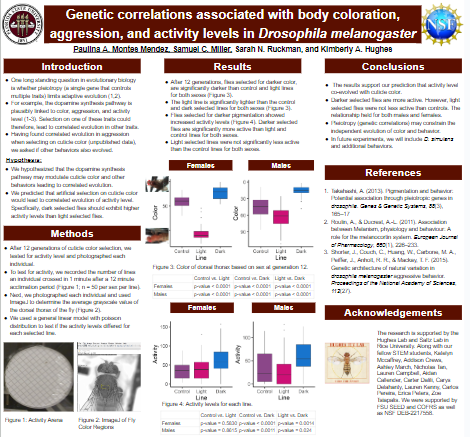Research Symposium
24th annual Undergraduate Research Symposium, April 3, 2024
Paulina Montes Mendez Poster Session 2: 10:45 am - 11:45 am/296
BIO
I was born in Mexico but moved to Naples, Fl when I was 2 years old. My parents wanted to provide me a better education and I feel as if I've fulfilled that dream so far. I aspire to get my PhD in a topic regarding genetics and have lucky been fortunate enough to have guidance from my mentor Sarah. Being a generation student hasn't been easy, but luckily I've made connections and friendships along the way that have led me to new goals and dreams.
Genetic correlations associated with body coloration, aggression, and activity levels in Drosophila melanogaster
Authors: Paulina Montes Mendez, Sarah RuckmanStudent Major: Biological science
Mentor: Sarah Ruckman
Mentor's Department: Biological Science Mentor's College: Florida State University Co-Presenters: Samuel Miller
Abstract
One long standing question in evolutionary biology is whether single genes that control multiple traits (pleiotropy) results in limitations on adaptive evolution. If it does, then our ability to predict adaptation (e.g., in the face of changing environments) is compromised. We are using a much-discussed correlation between body coloration and aggressive behavior as a system to address this question. Having found the predicted genetic correlation between cuticle color and aggressive behavior in Drosophila melanogaster using artificial selection (unpublished data), we then asked if any other behaviors co-evolved under selection on cuticle color. For example, the dopamine synthesis pathway is plausibly related to color, aggression, and other behaviors, such as activity level. We therefore measured activity level of flies (D. melanogaster) selected for darker and lighter cuticle color. Results suggest that activity level is higher in the dark-selected lines, suggesting that genetic correlations do constrain the independent evolution of cuticle color and behavior. The next step in this study to identify candidate genes underlying the correlation and test for pleiotropic effects using transgenic approaches.
Keywords: Drosophila Melanogaster, Aggression, behavior


